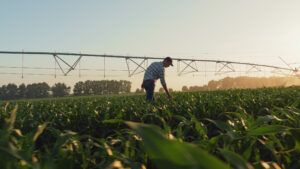British farmers face rationing of fertiliser as sanctions on Russia stoke fears about availability, leading to warnings of food shortages and hefty price rises.
The fertiliser market expects a supply squeeze and huge increases in price because Russia is the world’s biggest exporter. Last week the EU imposed sanctions on three large producers, Eurochem, PhosAgro and Uralchem.
The sector was already being tested by rising gas prices, which have also been affected by the war in Ukraine because markets had been reliant on Russian gas.
The cost of fertiliser, essential for growing crops and grass for cattle and lambs, has quadrupled in the past year from about £250 a tonne to nearer to £1,000. Farmers told The Times that some fertiliser merchants had temporarily closed their order books because of a lack of supply while others were rationing the amount that they could buy.
Gavin Lane, an arable farmer in west Norfolk and vice-president of the Country Land and Business Association, said that he had been restricted to buying two lorry loads, equivalent to 56 tonnes, at £908 a tonne, when he had needed double that amount.
Last year, he paid £250 a tonne from the same merchant. “There is hyperinflation in the market, and we don’t know what will happen to the price. Should we buy now to lock in for the next season? There’s fear which is causing people to buy now. There is a lot of risk and a lot of cash being outlaid before you see that money back.”
Tim Bradshaw, vice-president of the National Farmers’ Union, said that the biggest merchants, such as Frontier Agriculture and ADM Agriculture, were also restricting supply while two other growers said that smaller merchants were doing the same.
The UK imports 60 per cent of its fertiliser. Domestically, CF Fertilisers is running a scaled-down operation in Billingham on Teesside after receiving a government bailout last year when it said that the plant had become uneconomic because of rising gas prices. The company shut down its second site at Ince in Cheshire.
Norway’s Yara, one of the world’s biggest fertiliser makers, said last week that it would curtail ammonia and urea output in Italy and France to 45 per cent because of the rise in natural gas prices.
The situation has complications beyond vegetable farmers because Ukraine is the “bread basket of Europe” accounting for about 25 per cent of its supply of wheat, while almost three quarters of the country’s land is agricultural. John Rich, head of MHP, one of Ukraine’s biggest food producers, warned last week that if conflict continues and affects the ability to sow crops within the next two weeks the consequences for the world would be simple.
“The price of wheat will continue to rise, the price of corn and other commodities will rise significantly and you’ll have spiralling inflation.” Other countries would normally increase grain production to try to compensate for a shortfall but the squeeze on fertiliser supplies limits the scope for that.
“Yields could be lower if farmers choose, or are forced, to reduce fertiliser applications,” Anthony Speight, an analyst at the UK’s Agriculture and Horticulture Development Board, said.
Agriculture ministers from the G7 group of leading economies met last week to discuss food security implications of the war, amid fears that it could lead to a crisis for nations such as Egypt, Turkey and Bangladesh that have relied on Ukraine and Russia for their wheat, corn and sunflower oil.
The Arab Spring in 2010 was sparked by bread shortages and Russia and Ukraine provide more than 70 per cent of Egypt’s wheat imports. “We have a moral obligation in the UK to maximise production, we need to see policies that support this because the biggest importers are the poorest countries and if Britain starts importing more then there will be even less left for other developing nations,” Bradshaw said.
Joe Shepherdson of the Cucumber Growers’ Association said that British arable farmers faced “huge price increases across the board”, which had led to many delaying, or cancelling, their growing season. Typically the UK produces 80 million cucumbers a year but this year only 30 million will be produced.
“Similar decisions are being made by farmers in Holland and Spain, countries where the UK sources salad ingredients, which will result in a significant drop in European production and an inevitable surge in prices for shoppers.
Lee Stiles, head of the Lea Valley Growers Association in Essex, which produces three quarters of the UK’s pepper, cucumber and aubergine crop said that only half of its farmers had planted so far this month, which meant that production would halve.
Stiles said that gas used to be 20 per cent the cost of a production of a 50p cucumber, but he expected that price would have to double as gas prices soared to £8 a therm last week.
“Because of these gas prices there will inevitably be shortages on shelves, unless they can import more produce from South America. But it has never been economical or environmental to do that. It takes four days to get here from Spain as it is and as transport costs have jumped because fuel has shot up so that option seems unlikely. Shoppers will be in for a big shock,” Stiles said.
Read more:
Food shortage warning as fertiliser rationed
















